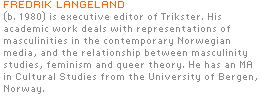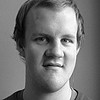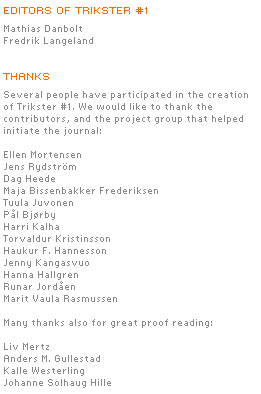|
|
The power of the trickster is as an intervener in and disturber of the ordinary. Not a particularly nice figure, the trickster is always a figure of danger, of risk-taking. - Donna Haraway, “Birth of the Kennel” Trikster - Nordic Queer Journal is the first Nordic magazine with a queer perspective on culture and politics. We have initiated Trikster because we missed a forum to discuss gender and sexual politics across academic, activist, political, and artistic borders. By naming Trikster a queer journal, we want to draw attention to the fact that you do not have to be anything to take part in the conversation (as for instance “homosexual”, “heterosexual”, “transsexual”, what ever these terms might signify). The focal point of Trikster is a queer perspective - a common ground for a critique of heteronormativity, sexism and racism. We endorse the queer fight against the structures that privilege and reward certain desires and ways of living, at the expense of others. During the last couple of years queer theory have found its place in many Nordic universities, and queer activist D.I.Y.-festivals are organized in Oslo, Aalborg, København and Aarhus, to mention only a few. But there are hardly any forums where academic and activist queer culture meet to exchange experiences, discuss politics, and develop strategies. We want Trikster to function as a critical platform where different communities, expressions, and languages come together. In Trikster we work across genres, and we are not afraid of being either activist, academic or political - or all these things at the same time. To be able to reach different audiences at different places, we have made Trikster a multilingual web-magazine free of charge. Trikster is structured in a way somewhat similar to printed journals - organized in issues, with a table of contents, and articles running over several “pages”. Still we use and explore the possibilities of the web, creating an open and flexible space. We release four issues a year, but our blog will frequently be updated with news and information concerning the Nordic queer scene. In the first issue of Trikster we proudly present contributions from both new and more establishes voices. We initiate the series Queer Norden? where academics, activists, and artists are invited to discuss what queer has done, does, and can do in the Nordic countries. The first part of the series includes contributions from Tiina Rosenberg, Agnes Bolsø, Mette Moestrup, Andy Candy and Mattias Pettersson, who all in different ways raise important debates on gender and sexual politics. Rosenberg shows why and how the political left wing should center on queer theoretical perspectives, and Bolsø offers a critique of how central politicians in the Norwegian gay and lesbian movements keep ideas about the powerless and miserable “homophile” in place. Moestrup points out how the Nordic feminist debate seems to be color-blind, while Andy Candy and Mattias Pettersson challenge stereotypes and confront myths about transgender in a poetic interactive art project. Trikster have also met with the American queer theorist Judith Halberstam, and discussed the relationship between queer theory, politics, and popular culture. In the interview “The Eccentric Archive”, Halberstam demonstrates how we can find alternatives to the established order in animated movies and low cultural expressions such as “stupid” Hollywood-comedies. Erik Steinskog also turns to pop culture to find new ways of thinking on gender and sexuality. In his analysis of the relationship between the voice, the body and gender in Antony Hegarty and Rufus Wainwright's performances, he challenges expectations of how the gendered body sounds. Anna Olovsdotter Lööv describes the development of the Swedish drag-king scene, and discusses the current interest in performing masculinity in relation to the feminist movements in the 1970s. Feminist heroines also figures in Hanna Hallgren and Jenny Tunedal's performance dialogue “Queer & Form”, where we meet a great variety of old and new texts. They approach the question of what queer literature is, by doing queer. The question is more important than the answer. In English a trickster signify a fraud, a charlatan, or a cheat. In mythology tricksters are funny, but often dangerous figures that break the rules of the gods and disturb the gender systems. Our Nordic Trikster has certainly no intentions to defraud or deceive anyone, but we would like to interrupt, provoke and excite you readers with new thoughts, voices, and modes of expressions. Welcome to our queer space! |
|







